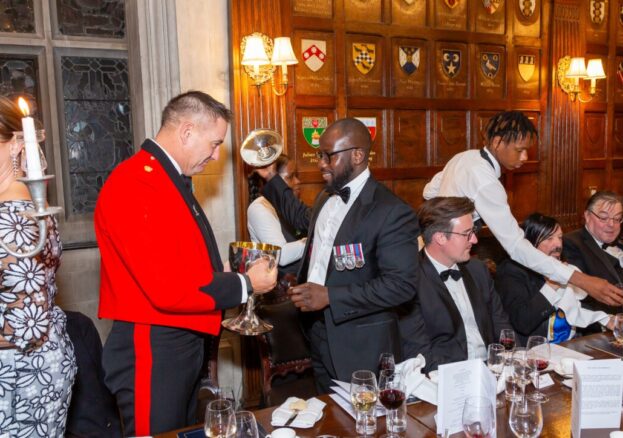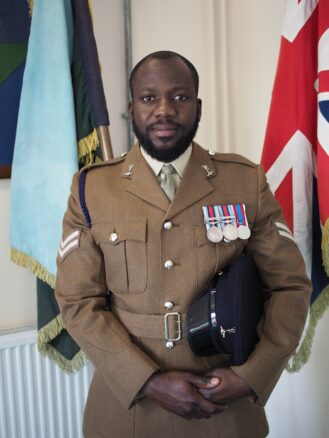
Most recently, those things include being the Technical Lead for 16 Signal Regiment’s winning team at this year’s Defence Cyber Marvel 3, beating 48 teams comprising more than 600 personnel from 17 countries.
Reflecting on his experiences from the first year of the competition in 2022 to now, Sergeant (Sgt) Adams said: “I’ve been able to apply learning from my Masters to tackle simulated cyber attacks on military, satellite, medical and government networks. Three years ago we were a small team created at the last minute – cyber is not our main role – and came fifth. So we were doing well against ‘the big boys’. Last year, when the competition expanded to other countries and industry partners, we worked alongside the Metropolitan Police and came fifth again.” The top five teams from last year were given the opportunity to compete alongside international counterparts in 2024, leading to Sgt Adams’ cyber analysts pairing up with a South Korean team this year to take home the win.
Since joining the Army 16 years ago, Sgt Adams has studied for a Bachelor’s degree in ICT alongside his job in the Royal Corps of Signals, before moving on to a Masters degree in Cyber Security. “Stafford University is affiliated to the British Army and the lecturers are used to having students who need flexibility on deadlines for training and deployments. I studied for my degree on exercise and even on operations in Iraq – anywhere I could,” he said. “This was my first introduction to cyber and I was really motivated by it so, as soon as I finished my Bachelors, I decided to do a Masters specialising in it.”

While his colleagues spent their time outside of work relaxing, Sgt Adams dedicated himself to studying: “They asked me why I was doing this to myself, but my job was flexible and most evenings I spent studying because I was staying on camp during the week anyway, so it wasn’t taking any time away from my family,” he explained. “My Chain of Command were also understanding – particularly when I started my Masters and I could apply what I was learning to my role. That’s when they really started to take it seriously.”
Studying for his Masters coincided with an opportunity to run a cyber lab in his building at work: “The guy who was looking after it was being posted elsewhere. It didn’t have many resources but I could see how I could get it up and running again and viewed it as an opportunity I could exploit while doing my Cyber Security Masters,” he said. “It was just after the pandemic and newly qualified soldiers were being posted to our unit straight from training, with an interest in cyber protection but limited knowledge and experience. I created a weekly cyber club which people could attend straight after work and, through the mentoring and coaching I provided, I was able to develop a group of committed people who went on to represent the unit in cyber competitions, as well as expanding my own skillset.”
This saw Sgt Adams become the only Junior Non-Commissioned Officer (JNCO) to win the Royal Signals’ Silver Award commendation in 2023 – the second highest award from the institution. He then went on to win the Engineer of the Year award from the Worshipful Company of Engineers, followed by the ‘Through’ award from the Worshipful Company of Information Technologists.
Winning these awards has not only been personally satisfying – it will also see him progress through the ranks quicker than normal. “It has massively helped my career to be awarded Engineer of the Year. I applied for the Foreman’s course as a Corporal, when applications are usually from Sergeants and above. After a lengthy interview process, I’ve just started this year on promotion. At the end of the course, you are eligible to promote to Staff Sergeant, so I’ll hopefully have been promoted twice in two years.”
It’s been a different journey to the one Pa Malick Adams had in mind when he came to the UK from Gambia in 2008. “I came to the UK to study at university, but it didn’t work out. So my cousin, who was already in the British Army, persuaded me to sign up as well,” said Sgt Adams, who initially joined the Royal Artillery, as he couldn’t join the Royal Signals until he’d been in the UK for five years. “My mum is still back in Gambia – as well as my uncle, who first introduced me to a computer. They are so immensely proud of everything I’ve been able to achieve. But not surprised!”
